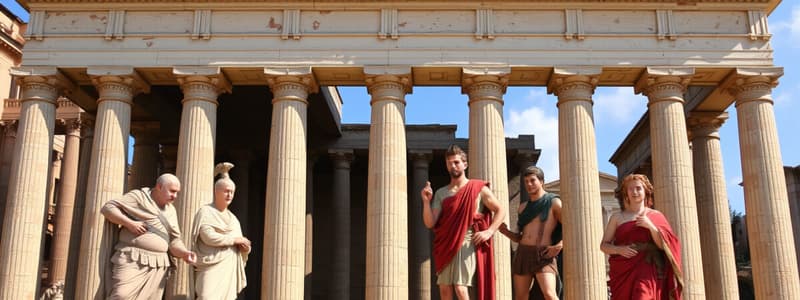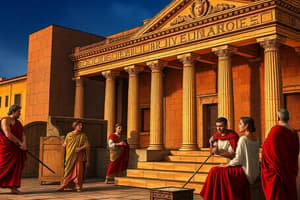Podcast
Questions and Answers
Who was the last king of Rome before the establishment of the Roman Republic?
Who was the last king of Rome before the establishment of the Roman Republic?
- Romulus
- Numa Pompilius
- Lucius Junius Brutus
- Tarquinius Superbus (correct)
Which figure is known for crossing the Rubicon, effectively declaring war on the Roman Senate?
Which figure is known for crossing the Rubicon, effectively declaring war on the Roman Senate?
- Lucius Junius Brutus
- Marcus Aurelius
- Pompey the Great
- Julius Caesar (correct)
Which Roman leader is credited with the establishment of the calendar and the Roman Senate?
Which Roman leader is credited with the establishment of the calendar and the Roman Senate?
- Augustus
- Trajan
- Numa Pompilius (correct)
- Nero
Who was the first emperor of Rome, known for establishing the Principate?
Who was the first emperor of Rome, known for establishing the Principate?
Which ruler is recognized as the first Christian emperor of Rome?
Which ruler is recognized as the first Christian emperor of Rome?
Flashcards are hidden until you start studying
Study Notes
Key Figures in Ancient Rome
Roman Kingdom (753 BC - 509 BC)
- Romulus (753 BC - 716 BC): Legendary founder of Rome, first king
- Numa Pompilius (715 BC - 673 BC): Second king, established Roman Senate and calendar
- Tarquinius Superbus (534 BC - 509 BC): Last king of Rome, overthrown in a revolution
Roman Republic (509 BC - 27 BC)
- Lucius Junius Brutus (509 BC): Led the revolution against Tarquinius Superbus, first consul
- Julius Caesar (100 BC - 44 BC): Transformed the Roman Republic, crossed the Rubicon, and became dictator
- Pompey the Great (106 BC - 48 BC): Powerful general and statesman, rival of Julius Caesar
- Cicero (106 BC - 43 BC): Influential statesman, orator, and philosopher
- Mark Antony (83 BC - 30 BC): General and politician, ally of Julius Caesar and later rival of Octavian
Roman Empire (27 BC - 476 AD)
- Augustus (27 BC - 14 AD): First emperor of Rome, established the Principate
- Trajan (98 - 117 AD): Successful emperor, expanded the empire to its greatest extent
- Marcus Aurelius (161 - 180 AD): Philosopher-emperor, ruled with wisdom and justice
- Constantine the Great (306 - 337 AD): First Christian emperor, founded Constantinople
- Nero (54 - 68 AD): Infamous emperor, known for tyranny and persecution of Christians
Key Figures in Ancient Rome
Roman Kingdom (753 BC - 509 BC)
- Romulus, the legendary founder of Rome, became the first king in 753 BC, establishing the city's origins.
- Numa Pompilius, the second king from 715 BC to 673 BC, is credited with creating the Roman Senate and the Roman calendar, influencing governance and timekeeping.
- Tarquinius Superbus, the last king (534 BC - 509 BC), was overthrown during a revolution due to his tyrannical rule, leading to the establishment of the Republic.
Roman Republic (509 BC - 27 BC)
- Lucius Junius Brutus led the revolt against Tarquinius Superbus, becoming the first consul in 509 BC, symbolizing the end of monarchy and the start of republican governance.
- Julius Caesar, born in 100 BC, crossed the Rubicon in 49 BC, an act of defiance that significantly altered the political landscape and led to his dictatorship until his assassination in 44 BC.
- Pompey the Great, born in 106 BC, was a renowned general and politician, known for his rivalry with Julius Caesar, which fueled political conflicts within Rome.
- Cicero, from 106 BC to 43 BC, became a pivotal statesman, renowned for his oratory skills and contributions to Roman philosophy and politics.
- Mark Antony, a general and politician (83 BC - 30 BC), was both an ally and later a rival of Julius Caesar and played a key role in the aftermath of Caesar's assassination.
Roman Empire (27 BC - 476 AD)
- Augustus, ruling from 27 BC to 14 AD, was the first emperor of Rome, known for establishing the Principate, setting the framework for imperial governance.
- Trajan oversaw the empire's expansion to its greatest territorial extent during his reign from 98 to 117 AD, noted for military achievements and public works.
- Marcus Aurelius, the philosopher-emperor (161 - 180 AD), is celebrated for his writings and a reign characterized by wisdom, virtue, and Stoic philosophy.
- Constantine the Great (306 - 337 AD) is significant as the first emperor to convert to Christianity and for founding Constantinople, which became a vital center of power.
- Nero’s reign (54 - 68 AD) is marked by infamy due to his tyrannical rule and persecution of Christians, reflecting the complexities of imperial authority.
Studying That Suits You
Use AI to generate personalized quizzes and flashcards to suit your learning preferences.




